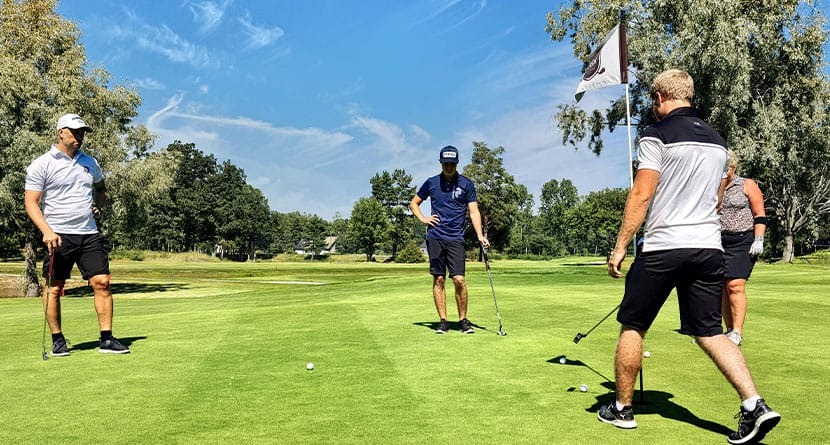The Inner Game: Mastering the Psychology of Golf for Success
Golf. It’s a sport that can deliver moments of pure joy and utter frustration, often within the same hole. You might hit a perfect drive, only to follow it with a disastrous chip or a missed short putt. Unlike many team sports where you can rely on others, in golf, it’s just you against the course, your swing, and perhaps most importantly, your mind. The constant pursuit of a lower score, the unforgiving nature of small errors, and the long stretches of quiet contemplation between shots make golf one of the most mentally challenging sports.
Many golfers dedicate countless hours to perfecting their physical swing, meticulously analyzing every movement. Yet, they often overlook the crucial role of their mental game. But mastering the psychology of golf is truly what separates consistent players from those who struggle. This article will explore why your mind is your most powerful club, and provide practical, easy-to-understand techniques to boost your focus, confidence, composure, and resilience on the course. Get ready to unlock new levels of consistency, enjoyment, and lower scores by mastering your inner game!
Why Your Mind is Your Most Powerful Club (Beyond the Swing)
Imagine two golfers with identical swings and physical abilities. What will set them apart on the scorecard? Often, it’s their mental approach. Here’s why your mind is your greatest asset in golf:
- Individual Sport, Nowhere to Hide: Every shot, every decision, every mistake is yours alone. There’s no teammate to cover for you. This creates intense personal pressure.
- Unforgiving Nature: Golf is a game of precision. A small error in alignment or clubface angle can send your ball wildly off course, often into trouble. The consequences of these small errors can be very punishing.
- Long Game Time: Unlike sports with constant action, golf has many quiet moments between shots. This ample time can be a blessing (for planning) or a curse (for overthinking, dwelling on past mistakes, or getting frustrated).
- Pressure Situations: Crucial putts on the 18th hole, tight lies near hazards, or needing to make a long drive to clear trouble – these moments test your composure.
- The “Snowball Effect” of Frustration: One bad shot can quickly lead to anger, which then leads to a rushed swing, another bad shot, and before you know it, a “blow-up” hole.
- Mental Fatigue is Real: Playing a long round of golf requires sustained mental focus. You might hit your best shots early on, but mental fatigue can cause a drop in concentration and decision-making later in the round, even before physical tiredness.
- Execution Under Pressure: Your swing might feel perfect on the driving range, but without mental toughness, you might struggle to execute that same swing when faced with a crucial shot in a match.
Mastering the “Inner Game” means winning the mental battle on the course, which directly translates to winning more shots.
The Golfer’s Mental Toolkit (Quick Overview)
Developing a strong golf psychology involves cultivating several key mental skills:
- Focus & Concentration: The ability to stay present and block out distractions.
- Confidence: A deep, unwavering belief in your abilities, even after a bad shot.
- Composure & Emotional Control: Managing nerves, anger, and frustration effectively.
- Resilience: The capacity to bounce back quickly from mistakes, bad holes, or tough breaks.
- Patience: Accepting results and waiting for the right opportunities.
- Positive Self-Talk: The inner voice that encourages and guides your thoughts.
Key Mental Strategies for Golf Success
Here are practical, easy-to-understand mental techniques you can start using on and off the course to boost your golf game:
1. Develop a Consistent Pre-Shot Routine
This is a ritual you perform before every shot, from a drive to a short putt. It’s your way of mentally preparing and committing to the shot.
- How it helps: It helps you detach from the previous shot (good or bad), refocus on the present task, and build confidence by consistently preparing the same way. It puts you in a consistent mental state.
- Practical advice:
- Visualize: Take a moment behind the ball to picture your desired shot (trajectory, landing spot).
- Decide: Commit to your club choice and target.
- Address the Ball: Step up to the ball, take your grip, and complete your swing key (a quick mental cue like “smooth tempo”).
- Execute: Hit the ball.
- Beginner Tip: Start simple. Just take two deep breaths, visualize your shot, and then step up and hit. Make it a non-negotiable part of every shot.
2. Master Positive Self-Talk
Your inner voice can be your best caddie or your worst critic. Positive self-talk is crucial for building and maintaining confidence.
- How it helps: It helps you stay motivated, believe in yourself, and counteract negative thoughts that can sabotage your swing and decision-making.
- Practical advice:
- Replace “Don’t hit it in the water!” with “Aim for the center of the green!”
- Replace “I always slice this shot!” with “Keep your left arm straight.”
- After a bad shot, say “Next shot!” or “Good swing, wrong result, focus on the next.”
- Use simple, encouraging phrases: “You got this,” “Smooth,” “Stay calm.”
- Beginner Tip: Become aware of your negative self-talk. Whenever you catch yourself saying something negative, immediately replace it with a positive, action-oriented phrase.
3. The “10-Second Rule” (Managing Mistakes)
Every golfer, even the pros, makes mistakes. How you react to those mistakes defines your mental toughness.
- How it helps: This technique helps you let go of errors quickly, preventing frustration or anger from spiraling into more mistakes on the next shot.
- Practical advice: After hitting a bad shot:
- Acknowledge (Briefly): Allow yourself to feel the frustration for about 10 seconds.
- Release: Take a deep breath. Shake out your hands. Look away from where the ball went wrong.
- Refocus: Immediately shift your attention to the next shot. Once you walk towards your ball, the previous shot is gone. Don’t let one bad shot infect the next one.
- Beginner Tip: Physically turn your back to the hole or path you just took after every shot, good or bad, for a few seconds. Use this time to physically and mentally reset.
4. Visualize Success (The “Perfect Shot”)
Your brain doesn’t always know the difference between a real experience and a vividly imagined one. Visualization builds confidence and programs your mind for success.
- How it helps: Prepares you for success, reduces anxiety, and helps “program” your brain and body for desired outcomes.
- Practical advice: Before hitting any shot:
- See It: Clearly visualize the flight of your ball, its trajectory, and where it lands.
- Feel It: Imagine the feeling of a perfect swing, solid contact, and the ball traveling precisely as you intended.
- Hear It: Imagine the sound of the ball coming off the clubface exactly right.
- Beginner Tip: Before every tee shot, close your eyes for a few seconds and visualize yourself hitting a perfect shot down the middle of the fairway.
5. Focus on the Process, Not the Outcome
It’s natural to want a good score, but focusing too much on the score can create immense pressure and lead to mistakes.
- How it helps: Keeps you present, focused on what you can control (your swing, your strategy for this shot), rather than what you can’t (where the ball might go, what your final score will be).
- Practical advice: Instead of thinking “I must make this putt to save par,” think “I need to align this putt correctly, read the break, and make a smooth stroke.”
- Beginner Tip: For each shot, give yourself one simple instruction (e.g., “Keep my head down,” “Smooth tempo”). Focus only on that one thing.
6. Manage Your Expectations (Be Realistic)
Unrealistic expectations are a major source of frustration in golf.
- How it helps: Reduces self-imposed pressure, allows for more enjoyment, and helps you stay positive even when things don’t go perfectly.
- Practical advice:
- As a beginner, don’t expect to shoot par. Celebrate making good contact, getting on the green in regulation (or close), or making a solid putt.
- Understand that golf is hard, even for pros. Accept that you’ll hit bad shots.
- Set “process goals” (e.g., “I will complete my pre-shot routine every time”) rather than just “outcome goals” (e.g., “I will make a birdie”).
- Beginner Tip: Before your round, choose one simple, achievable goal (e.g., “I will hit at least 5 fairways,” or “I will only three-putt once”).
7. Practice Gratitude & Enjoy the Walk
Golf offers an incredible connection with nature and a chance to escape daily stress. Don’t let frustration ruin it.
- How it helps: Shifts your focus from disappointment to appreciation, reduces overall stress, and enhances enjoyment.
- Practical advice: Between shots, take a moment to look at the beautiful surroundings, feel the sun, or appreciate the company of your playing partners. Remember why you started playing golf.
- Beginner Tip: After a bad shot, take a deep breath and consciously look at something beautiful on the course (a tree, a flower, a view).
Building Your Mental Game Routine (Off-Course Practice)
Just like physical fitness, your mental game benefits from consistent practice:
- Daily Mindfulness/Meditation: Spend 5-10 minutes each day on mindful breathing or a guided meditation. This builds your “focus muscle” and improves your ability to stay present.
- Journaling: After rounds or practice sessions, write down what went well mentally, what was challenging, and how you reacted. This helps you learn from your experiences and process emotions.
- Visualization Practice: Regularly spend time vividly visualizing successful golf shots and calmly managing pressure situations, even if just for a few minutes.
- Physical Fitness: Your mental resilience is deeply tied to your physical well-being. Prioritize good sleep, a balanced diet, and regular exercise.
- Realistic Practice: When practicing, try to recreate some pressure situations (e.g., “this is for a birdie,” “I need to get out of this bunker”).
Conclusion: Your Pathway to Golfing Success
Golf is a complex, beautiful, and often frustrating game. While perfecting your swing is a lifelong pursuit, truly mastering the game requires an equally dedicated focus on your mental game. Your mind is your most powerful club, capable of either elevating your performance to new heights or sending you spiraling into frustration.
By embracing strategies like a consistent pre-shot routine, positive self-talk, effectively managing mistakes, visualizing success, and focusing on the process over the outcome, you can build unwavering confidence, maintain composure under pressure, and unlock new levels of consistency and enjoyment on the course. Dedicate time to sharpening your mind, just as you would your physical swing. Your improved mental game will not only lead to lower scores but also a much more rewarding and joyful golfing experience.





Laor blan
Awesome work and information